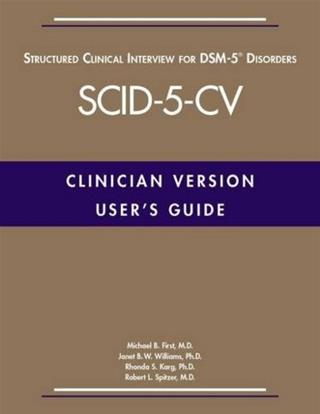

Journal of Personality Disorders, 12(2), 149-161.įennig, S., Bromet, E.

Patient-informant concordance on the Structured Clinical Interview for DSM-III-R personality disorders (SCID-II).
#Structured clinical interview scid license
The SCID-5-CV is a proprietary instrument and administration requires a license from the American Psychiatric Association: General Referencesĭreessen, L., Hildebrand, M., & Arntz, A. Structured Clinical Interview for DSM-5® Disorders-Clinician Version (SCID-5-CV) Washington, DC: American Psychiatric Association. Structured Clinical Interview for DSM-5 Disorders - Clinician Version (SCID-5-CV) Sourceįirst, M. The SCID-5-CV is a proprietary instrument and administration requires a license from the American Psychiatric Association: The SCID-5-CV can be used to ensure that the major DSM-5 diagnoses are evaluated, to select study populations, and characterize current and previous psychiatric diagnoses. It also screens for 17 additional DSM-5 disorders. The SCID-5-CV covers the DSM-5 diagnoses most often encountered in the clinic, including depressive and bipolar disorders, schizophrenia spectrum and other psychotic disorders, substance use disorders, anxiety disorders (panic disorder, agoraphobia, social anxiety disorder, generalized anxiety disorder), obsessive-compulsive disorder, posttraumatic stress disorder, attention-deficit/hyperactivity disorder, and adjustment disorder.
#Structured clinical interview scid manual
The Structured Clinical Interview for DSM-5® Disorders-Clinician Version (SCID-5-CV) is a clinician-administered, semi-structured interview guide for making diagnoses using the Diagnostic and Statistical Manual of Mental Disorders, 5th Edition (DSM-5). Symptoms of Autism Spectrum Disorders - Child.Symptoms of Autism Spectrum Disorders - Adult.Symptoms of Autism Spectrum Disorders - Adolescent.Substance Abuse and Dependence - Past Year - Tobacco.Substance Abuse and Dependence - Past Year - Drugs.Substance Abuse and Dependence - Past Year - Alcohol.PTSD Symptoms, Severity, and Diagnosis - DSM-IV.PTSD Symptoms, Severity, and Diagnosis - DSM 5.Lack of Prosocial Emotions - Children - Teacher-report Version.Lack of Prosocial Emotions - Children - Self-report Version.



 0 kommentar(er)
0 kommentar(er)
